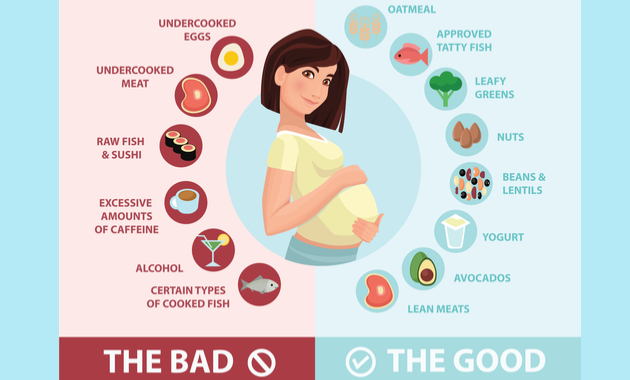Top 10 Nutrition Tips During Pregnancy: Pregnancy is one of the most critical times in a woman’s life when it comes to nutrition. The food choices you make while expecting can have a profound impact not only on your own health but also on the development and long-term well-being of your baby. According to Dr. Kandis Samuels, MD, MPH, a family medicine and women’s health physician at Bayhealth, following a well-balanced pregnancy diet supports a healthy weight, prevents complications like gestational diabetes or preeclampsia, and ensures proper fetal growth.
Let’s explore 10 doctor-recommended nutrition tips for expecting mothers that will help create a solid foundation for a healthy pregnancy journey.

10 Essential Pregnancy Nutrition Tips to Get You Started
1. Eat Regular Meals and Snacks
Aim to consume three balanced meals and three nutritious snacks daily. Your body needs consistent fuel during pregnancy to support increased energy demands, hormone production, and fetal development. Skipping meals can lead to nausea, fatigue, or blood sugar fluctuations.
2. Add Protein to Every Meal
Protein is the building block of life and is especially important during pregnancy to support the baby’s growth, including the development of muscles, brain, and tissues. Incorporate protein-rich foods like:
- Eggs
- Cheese
- Greek yogurt
- Beans and lentils
- Lean poultry
- Nuts and nut butters
Try to include a source of protein with every meal and snack.
3. Choose Fiber-Rich Foods
Pregnancy hormones can slow digestion, leading to constipation. Boost your fiber intake with whole foods such as:
- Fresh fruits (apples, pears, berries)
- Vegetables (broccoli, spinach, carrots)
- Whole grains (brown rice, oats, quinoa)
- Legumes
Fiber helps maintain healthy digestion and supports steady blood sugar levels.
4. Limit Added Sugars
Excessive sugar intake can lead to unnecessary weight gain, gestational diabetes, and energy crashes. Read ingredient labels and avoid foods that list the following as one of the first four ingredients:
- Sugar
- Corn syrup
- Fructose
- Dextrose
- Glucose
- Honey
- Corn sweetener
Choose natural sugar alternatives such as fruit when craving something sweet.
5. Avoid Processed Meats
Lunch meats, hot dogs, and deli meats often contain high sodium levels and can be contaminated with Listeria, a bacteria that causes listeriosis. This infection increases the risk of:
- Premature labor
- Miscarriage
- Stillbirth
If you must eat deli meats, heat them thoroughly to kill any harmful bacteria.
6. Skip Soft Cheeses and Unpasteurized Dairy
Soft cheeses like feta, Brie, Camembert, blue cheese, and queso fresco can also carry Listeria if unpasteurized. The FDA advises pregnant women to avoid:
- Raw or unpasteurized milk
- Any dairy products made from unpasteurized milk
Opt for hard cheeses and pasteurized versions instead.
7. Limit High-Mercury Fish
Certain fish species like shark, swordfish, king mackerel, and tilefish contain high levels of mercury, which can harm your baby’s developing brain and nervous system. Limit Albacore tuna and tuna steak to no more than 6 ounces per week.
8. Choose Safe, Omega-3-Rich Seafood
Seafood is a great source of omega-3 fatty acids, which are essential for fetal brain development. Safe options to eat (up to 12 ounces per week) include:
- Salmon
- Sardines
- Herring
- Trout
- Shrimp
- Cod
- Catfish
- Pollock
Avoid raw fish and undercooked seafood (e.g., sushi) due to bacteria risk.
9. Avoid Fried Foods
Fried and greasy foods can contribute to heartburn, weight gain, and poor digestion. Instead, cook your meals using healthier techniques like:
- Baking
- Broiling
- Boiling
- Roasting
- Air frying
This helps preserve nutrients while avoiding unhealthy fats.
10. Never Go More Than 10 Hours Without Eating
Going long periods without food can lead to blood sugar drops, dizziness, and fatigue. Even if you’re not feeling hungry, a small snack like a banana or a handful of nuts can keep your metabolism steady and energy levels up.
Special Considerations: Managing Gestational Conditions
Gestational Diabetes
If you have a family history of diabetes, focus on:
- Low-glycemic index foods
- Consistent meal timing
- Controlled portions of carbohydrates
Work with a healthcare provider to monitor blood glucose levels regularly.
Preeclampsia
To reduce the risk of high blood pressure during pregnancy:
- Reduce sodium intake
- Increase potassium-rich foods (like bananas and sweet potatoes)
- Stay well-hydrated
- Follow your doctor’s prenatal care plan closely
Hydration Tips for Pregnancy
Don’t forget to drink plenty of fluids! Water is essential for:
- Amniotic fluid production
- Nutrient transportation
- Preventing urinary tract infections (UTIs)
- Avoiding constipation
Aim for at least 8–10 cups of water per day, more if you’re active or it’s hot outside.
FAQs: Nutrition Tips During Pregnancy
Q1. What foods should I avoid during pregnancy?
Avoid soft cheeses, unpasteurized milk, raw or undercooked meats and fish, deli meats (unless heated), high-mercury fish, and foods high in added sugars.
Q2. How much water should I drink while pregnant?
You should aim to drink 8–10 cups of water daily. Hydration needs may increase in hotter weather or with increased physical activity.
Q3. Is it safe to eat seafood while pregnant?
Yes, but choose low-mercury options like salmon, sardines, and shrimp. Avoid high-mercury fish like shark and swordfish. Limit intake to 12 ounces per week.
Q4. How can I get enough protein during pregnancy?
Include protein-rich foods in every meal, such as eggs, beans, lean meats, dairy, and nuts. This supports your baby’s growth and keeps you energized.
Q5. Can I follow a vegetarian or vegan diet during pregnancy?
Yes, with proper planning. Make sure to get enough iron, protein, calcium, and vitamin B12. Consult a registered dietitian or OB-GYN for support.




